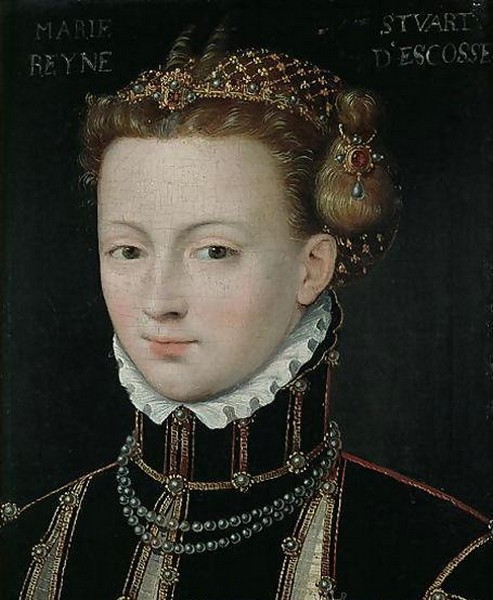
Gedichte der Königin Maria Stuart is Robert Schumann's last cycle, composed in December 1852. These songs were virtually his last too as he only wrote two more. The story of Mary had already attracted Schiller's attention, who had written his drama based on the Queen’s last days, Maria Stuart, in 1800. It had also attracted Donizetti, who composed in 1835 his opera Maria Stuarda upon Schiller's work, and Schumann paid attention to some poems attributed to the Queen, translated and included by Gisbert von Vincke in his collection of poetry Rose und Distel. Poesien aus England und Schottland (Rose and Thistle. Poems from England and Scotland), published in 1853. You're thinking that those dates don't match, aren't you? Schumann might have known those poems before their publication; It wouldn't have been unusual, given his interest in literature. Likewise, the poems could had been published in an almanac previously.
At that time, authors were attracted by that tragic character, considered a victim herself. Of course, historians have their own opinion about this romanticized vision of someone who was born between conspiracies and dynastic disputes, but some notes about her biography are enough to understand the empathy towards her. For example, she became queen on December 14, 1542, six days after being born, thus becoming a threat, a symbol and a bargaining chip. At five, she was engaged to the Dolphin and taken to the court of France, from where she had to leave at eighteen as a widow, after just one year of marriage.
Schumann's cycle begins at this point, with Abschied von Frankreich, where the queen bids farewell to the only home she remembers; Nach der Geburt ihres Sohnes is a prayer of thanks after the birth of his son (that was in 1566; a year later, she was forced to abdicate in his favour); An die Königin Elisabeth is a letter from the Queen of Scotland to the Queen of England asking for help; Elizabeth I wasn't really interested in helping her, since for Catholics, she was the illegitimate daughter of Henry VIII and her cousin Mary was the only legitimate queen of England. So, she kept Mary imprisoned for nineteen years, until she decided to execute her; those are the facts reflected in the songs Abschied von der Welt (Farewell to the world) and Gebet (Prayer). Sixteen years after Mary's death, her son James became King of England.
As we can see, Schumann overlooks political intrigues and focuses on the queen’s suffering. His cycle links with two others: on one hand, Frauenliebe und -leben (A woman' life and love), composed in 1840. Gedichte der Königin Maria Stuart is also about a woman's life, although, in this case, the composer disregards love and marriage (Henry II of France was followed by two other husbands, one of whom, according to her enemies, would have been murdered by Mary). The other cycle which is related to is Sieben Lieder von Elisabeth Kulmann, composed in the middle of the year 1851. In addition to the period of composition, the poems’ authors are two women (that's pretty unique), with unhappy lives and premature death.
I already said that the poems of Gedichte der Königin Maria Stuart were attributed to the queen, her authorship is doubtful; Several researchers have revealed that, most likely, most were written by other hands, Schumann or Vincke not being aware of this. Musically, the cycle shares with other works from the same period, the economy of means and the appearance of fragility; Schumann tells us about a honourable and helpless queen and, inevitably, touches us. We'll listen to the last song of the cycle, Gebet. According to some sources, Mary would have written this prayer some hours before her execution, on February 8, 1587, when she was forty-five; I copy below the original Latin poem. Other sources attribute the poem to Henry Harington, who lived between 1727 and 1816. At least, we don't have any doubt about our performers: Juliane Banse and Graham Johnson.
Ich hoffe auf Dich!
O Jesu, Geliebter,
Nun rette Du mich!
Im harten Gefängnis,
In schlimmer Bedrängnis
Ersehne ich Dich;
In Klagen, dir klagend,
Im Staube verzagend,
Erhör’, ich beschwöre,
Und rette Du mich!
I place my trust in Thee!
Oh Jesus, Beloved,
Save me now!
In a cruel prison,
In sore distress
I yearn for Thee;
In lamentations sobbing to Thee,
Despairing in the dust,
Hear my plea, I implore Thee,
And save Thou me!
(translation by Sharon Krebs)
speravi in te.
O care mi Jesu,
nunc libera me!
In dura catena,
in misera poena,
Desidero te;
Languendo, gemendo
et genuflectendo
Adoro, imploro
ut liberes me!













Comments powered by CComment